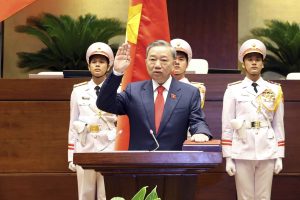President To Lam on Thursday became the caretaker of the Communist Party of Vietnam (CPV) because of party chief Nguyen Phu Trong’s poor health, the party said in a statement.
Trong, who was elected to a third term as general secretary in 2021, has dominated Vietnamese politics since he became party chief in 2011. He is an ideologue who views corruption as the gravest threat facing the party.
However, at age 80, Trong’s health has been of growing concern. He suffered a stroke in April 2019 and has often appeared frail and unwell in his public appearances since. In January 2024, Trong failed to meet with successive high-level visitors, Laos’ prime minister and Indonesia’s president, again sparking rumors that he had suffered a health crisis.
The CPV statement finally confirmed Trong’s ill health, which had long been rumored, but didn’t give any further details.
The party’s powerful Politburo has now asked Lam to “preside over the work of the Party Central Committee, the Politburo, and the Secretariat,” according to a statement from the party’s central office.
Lam is widely viewed as the top candidate to replace Trong when the latter’s term ends in 2026. He spent over four decades in the Ministry of Public Security before becoming the minister in 2016 and had been a key figure in the execution of anti-corruption measures.
As Vietnam’s top security official, Lam led Trong’s sweeping anti-graft campaign until May, when he became president following the resignation of his predecessor, who stood down after being caught by the campaign.
Lam’s ascension to the presidency, and now to the top of the CPV, at least in an interim capacity, comes amid an era of uncertainty and turmoil for Vietnamese politics. In March, Vo Van Thuong resigned as president; a month later, Vuong Dinh Hue, the chairperson of the National Assembly, followed suit. Both departed over unspecified “violations” of party discipline, presumably involvement in corruption cases.
As The Diplomat’s Sebastian Strangio wrote at the time, the resignations “left two of the country’s ‘four pillars’ – its four most powerful political posts – vacant… The [anti-corruption] campaign has also left empty five of the 18 seats on the Politburo, the CPV’s apex decision-making body.”
Notably, Thuong had only held the presidency for a little over a year before being forced out. His predecessor, Nguyen Xuan Phuc, also resigned after being implicated in a corruption case.
Lam, as minister of public security, was a key figure in the anti-corruption campaign that has conveniently sidelined his rivals in the race to replace Trong at the next CPV National Congress in early 2026. Now Lam is assuming the top post earlier than expected – and perhaps for good. While the CPV was tight-lipped on the exact state of Trong’s health, and whether he might resume his duties, rumors in Vietnam suggest his death might be imminent.
The formal announcement of Lam as interim leader seems to lock up his quest to succeed Trong and could potentially bring an end to Vietnam’s rare period of political instability. The cost, however, will be a newly dominant role for Lam’s security-focused peers in Vietnam’s political landscape, which has traditionally balanced power between different portfolios.
































